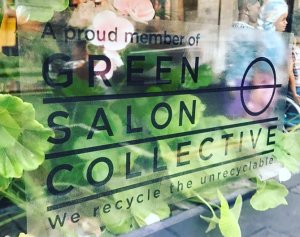This week is Recycle Week and the latest reports on recycling encourage households to put a separate recycling bin in the bathroom. The logic behind the advice from WRAP is that many families dispose of rubbish that could recycled in the general waste bin due to convenience, yet many common bathroom items such as shampoo bottles and toilets roll tubes are recyclable.
This is true of hair and beauty salons too, much of the waste that salons actually produce is recyclable but it is having the time, convenience and the right information that makes all the difference.
So what are the biggest culprits lurking in salon bins and how can you reduce them?
Foil
It is vital that salons and colleges across the United Kingdom begin to realise the value of recycling, especially as an industry that relies heavily on aluminium foil for essential services.
Extraction involves open cast, or strip mining which leaves deep scars on the landscape as well as disrupting local ecosystems and impacting upon biodiversity.
Foil itself takes over four hundred years as a minimum to break down if it is sent to landfill, yet just 1% of salons recycle their foil.
Local councils have different criteria for recycling aluminium foil, to find out if your local council collects unwashed foil follow this link; http://local.direct.gov.uk/LDGRedirect/index.jsp?LGSL=851
Alternatives such as foam wraps have been discussed recently due to their potential to be more environmentally friendly in comparison to foil, as some salons re-use the wraps because they do not lose their shape or strength. However, they take almost the same amount of time as foil to biodegrade and cannot be recycled, which highlights the urgent need for alternative solutions in the future.
More environmentally friendly services have emerged, almost by chance, the onset of colouring trends such as ombres, balyage and babylights often involve mainly freehand work and thus the demand for foil has reduced as a result.
Plastic
Shampoo, conditioner and other products are often packaged in plastic that do not biodegrade. The large bottles that are used at the basins can take up lots of room in the salon waste once they are empty. Did you know that the UK alone produces 3 million tonnes of plastic waste every year, yet just 7% is recycled?
Worryingly, this week’s research shows that empty shampoo and conditioner bottles are used in the room of the house where people forget to recycle, if salons can integrate recycling into their daily habits they can set an example to clients across the UK who are struggling with this area.
To reduce plastic waste in the salon environment, adopt recycling, and check product bottles and other plastic waste to see if they can be recycled before disposing of them. Opt for a product line that uses biodegradable, or recyclable packaging to ensure a long term commitment within the salon to sustainability.
By adopting a product range that uses responsible packaging, it provides a talking point with clients and can help to educate those who do not consider the impact of plastic shampoo and conditioner bottles.
The Waste Pyramid
The Waste Pyramid is a great way to understand how to deal with the waste that comes into your salon, college or home. It highlights the importance of ‘reducing’ and ‘re-using’ waste before it is even recycled and this really can help toward reducing waste and saving money.
As you can see from the diagram the least environmentally friendly option is to ‘dispose’ of the waste, as this waste is sent to landfill and puts pressure on resources that need to replace those that have been disposed of.
Reduce
To start with the most favourable option of ‘reducing’ the amount of waste that comes into your salon or college, speak to suppliers and ask them to reduce the amount of packaging that they deliver your products in, or arrange to give it back to them upon the next delivery so that they can re-use the materials.
Re-use
The second most favourable option is to ‘re-use’ waste and surprisingly, common salon items can actually support environmental causes as well as improving social issues. Hair clippings are a great example of creative ‘re-use’ that are often swept up and disposed of. On a local level, hair clippings help to make great compost and can be donated to community allotments, botanic gardens, wormeries which helps community projects to become more sustainable.
On a global level, hair clippings are also sought after during oil spills. The donated hair is used to make hair mats that are then placed on top of the water where the oil slicks have formed to absorb the oil and prevent any further damage to the ecosystems and wildlife that have been affected and exposed to the hazard.
Hair clippings of a certain length can also be used to make wigs, so the next time you are about to perform a re-style on long hair ask yourself is the hair long enough to donate to a cancer charity that makes wigs for those having treatment? This is something that eases social problems within the UK and can help cancer charities to support patients, whilst being able to spend their budget on other important resources, and all this is made possible by donating hair that would have been thrown away and sent to landfill.
Little Princess Trust is a UK based cancer charity which provides wigs to children who have lost their hair through treatment, you can find more information about suitable hair types on their website;
http://www.littleprincesses.org.uk/donate-hair/
Embedding this information into salons and colleges can help the younger generation to think about waste as a vital resource and consider their impact on environmental and social issues throughout their career.
The creative use of hair clippings don’t just stop there, they can also be re-used to create eco, avant guarde creations by moulding them into different shapes such as flowers, hearts and even hats! Talent from VTCT toured the national hair shows this year and presented their latest creations, showing us the potential of ‘old’ hair clippings. Jennifer Lenard is a real inspiration to the industry and created the look below!
Recycle
Working down the Waste Pyramid, we come to ‘recycling’ which is beneficial to the environment as it requires less energy to make new materials, it preserves vital resources and reduces pressure on landfills.
A study at Bangor University found that many common salon items can actually be recycled if recycling stations are effectively integrated into the salon environment. Each recycling station was set up in convenient areas of the salon such as the stock room, the staff room and by the basins. Each recycling box was labelled with the common salon items that could be recycled and each member of the the team took part. The study found that a regular salon with four members of staff successfully reduced the waste that it sent to landfill by 75%, this provides a promising picture for the future of hairdressing.
Industry Success Stories
It is essential that efforts to tackle waste are supported by salon managers, salon staff, suppliers and local councils if long term sustainability is to be achieved.
Kevin.Murphy is one supplier who is flying the flag for the industry and is committed to providing hair products that are made from natural ingredients which are from renewable or sustainable sources. The company successfully uses packaging that is recyclable which reduces the harmful effects that plastic can have upon the environment if it is recycled by the salon or the client. The company has also made a commitment to ensure that its secondary packaging is made from 100% post consumer waste or is biodegradable.
O’right is another industry success story and has taken green beauty to the next level by introducing their revolutionary product; Tree in a Bottle. The pioneering product has a seed pod built into its shampoo bottle and grows into an acacia tree. The packaging is 100% biodegradable and under compost conditions can break down within 28 days leaving no impact on the environment.
Kevin.Murphy and O’right are providing environmental stewardship to an industry which needs innovation and beauty built into their products. The professional ranges ensure minimal impact on the environment and are made in factories that use renewable energy, they are sulphate and paraben free, are not tested on animals and can be recycled or, biodegrade at the end of their life. These product lines are a great example of what can be achieved in the hair and beauty industry and how vital it is that sustainability becomes part of our future.
Useful tips for reducing the waste in your salon
- Get in touch with your local council as many offer financial incentives to encourage businesses to recycle and reduce the amount of waste that is sent to landfill.
- Integrate recycling bins into salons or colleges and make sure that they are labelled clearly with common salon items so that everyone can get involved.
- Hold eco competitions for staff and learners to encourage them to think about waste, electricity and water usage. Examples could include re-using hair clippings to create avant guarde styles and creations that do not need heated appliances such as braids, buns, wraps and so on.
- Write to suppliers and councils, and ask them to support you in your efforts.
- Monitor how much waste that you save going to landfill by collecting data before and after you adopt recycling. Tell your clients and stakeholders about your efforts so that they don’t go unnoticed and you can raise awareness about recycling in your local community too.
- Promote products that are packaged in biodegradable or recyclable materials and educate clients about the importance of recycling their shampoo and conditioner bottles once they are finished with.
- Think about what you are putting your retail products in, are you providing clients with a biodegradable bag? If not make the change to paper bags that are FSC certified.
Important: Legislation
You must register as a waste carrier if you want to dispose of your own waste regularly. Apply to register in:
England
Wales
Scotland
Northern Ireland
Depending on what you’re doing, you may also need to apply for a waste permit and make sure the recipient of your waste is registered also.















